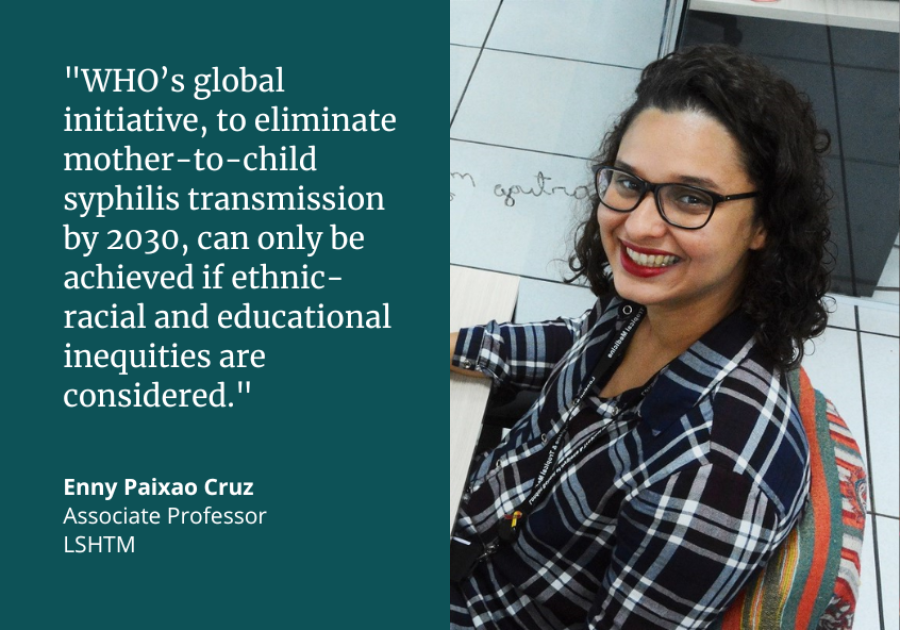Almost 90% of mother-to-baby syphilis transmission in Brazil could be prevented
19 October 2023 London School of Hygiene & Tropical Medicine London School of Hygiene & Tropical Medicine https://lshtm.ac.uk/themes/custom/lshtm/images/lshtm-logo-black.png
Racial and educational inequities could be influencing factors in 89% of mother-to-child syphilis transmission across Brazil, according to new research published in The Lancet Global Health.
The observational study, led by researchers at the London School of Hygiene & Tropical Medicine (LSHTM), analysed over 15 million birth records across Brazil, including over 144,000 recorded cases of maternal syphilis and over 79,000 cases of congenital syphilis, where syphilis is present from birth.
Their analyses suggest that Black and Parda/Brown women have an increased risk of syphilis infection compared with White women. Black women were found to be more than twice as likely to have a positive infection than White women and Parda/Brown women more than one-and-a-half times more likely than White women.
The findings also indicate that a substantial proportion of infection in both mothers and babies may not have occurred if all women in the dataset had the same risk as White women, with 35% of syphilis recorded during pregnancy and 41% of syphilis transmission to babies potentially prevented.
These figures rise to 86% of syphilis recorded during pregnancy and 89% of syphilis transmission to babies being prevented if all women had the same risk as White women with more than 12 years of education.
The research team also found that Black and Parda/Brown women are less likely to have a timely syphilis diagnosis, to receive adequate treatment for syphilis infection and for their partners to be treated, in comparison to White women.
Dr Enny Paixao Cruz, Associate Professor at LSHTM who led the study, said: “Untreated syphilis in expectant mothers has been linked to numerous adverse health outcomes in babies, including stillbirths and neurodevelopmental issues.
“Despite international efforts to eliminate syphilis infection from mother to baby, it remains prevalent in several low- and middle-income countries.
“The highest rates are currently observed in the African and Eastern Mediterranean regions yet until now, there has been no estimation of the burden of syphilis attributed to ethnic-racial inequities.
“The World Health Organization’s (WHO) global health initiative, to eliminate mother-to-child syphilis transmission by 2030, can only be achieved if ethnic-racial and educational inequities are considered.”
About the study
The research used administrative data representing the births of a single child from 1 January 2012 to 31 December 2017 from the Brazilian Live Births Information System, which covers over 90% of all births in the Brazilian territory.
The researchers caveat that this is an observational study of medical records and that further controlled studies would be needed to confirm these differences.
Publication
Enny S Paixao, Andrêa J F Ferreira, Julia M Pescarini, Kerry L M Wong, Emanuelle Goes, Rosemeire Fiaccone, Guilherme Lopes de Oliveira, Poliana Reboucas, Andrey Moreira Cardoso, Liam Smeeth, Mauricio L Barreto, Laura C Rodrigues and Maria Yury Ichihara. Maternal and congenital syphilis attributable to ethnoracial inequalities: a national record-linkage longitudinal study of 15 million births in Brazil. The Lancet Global Health. doi.org/10.1016/S2214-109X(23)00405-9
If you enjoyed this article and would like to build a career in global health, we offer a range of MSc programmes covering health and data, infectious and tropical diseases, population health, and public health and policy.
Available on campus or online, including flexible study that works around your work and home life, be part of a global community at the UK's no.1 public health university.